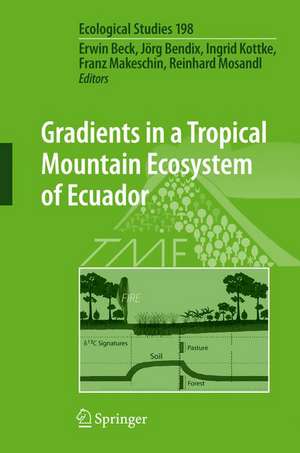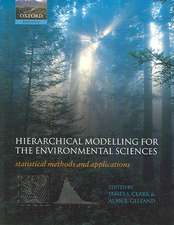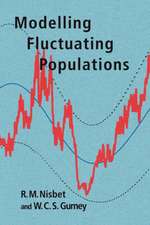Gradients in a Tropical Mountain Ecosystem of Ecuador: Ecological Studies, cartea 198
Editat de Erwin Beck, Jörg Bendix, Ingrid Kottke, Franz Makeschin, Reinhard Mosandlen Limba Engleză Hardback – 11 feb 2008
This volume addresses a multitude of ecologically relevant aspects: macro- and microclimate; physics, chemistry and biology of soils; water relations, matter turnover and nutrient availability; plant growth and biomass partitioning; floral composition and plant life forms; vegetation structure and dynamics; organismic interactions, diversity and population biology of birds, moths and microarthropods; forest management, and reforestation with indigenous species; ethnobotanical and social aspects. New hypotheses are presented with regard to biodiversity and ecosystem functioning, as well as sustainable management of an ecosystem in a biodiversity hotspot.
| Toate formatele și edițiile | Preț | Express |
|---|---|---|
| Paperback (1) | 1827.80 lei 6-8 săpt. | |
| Springer Berlin, Heidelberg – 22 noi 2010 | 1827.80 lei 6-8 săpt. | |
| Hardback (1) | 1834.10 lei 6-8 săpt. | |
| Springer Berlin, Heidelberg – 11 feb 2008 | 1834.10 lei 6-8 săpt. |
Din seria Ecological Studies
- 18%
 Preț: 1118.93 lei
Preț: 1118.93 lei -
 Preț: 553.71 lei
Preț: 553.71 lei - 18%
 Preț: 1680.55 lei
Preț: 1680.55 lei - 18%
 Preț: 1003.38 lei
Preț: 1003.38 lei - 20%
 Preț: 1004.69 lei
Preț: 1004.69 lei -
 Preț: 480.62 lei
Preț: 480.62 lei - 5%
 Preț: 752.26 lei
Preț: 752.26 lei - 15%
 Preț: 643.99 lei
Preț: 643.99 lei - 15%
 Preț: 644.18 lei
Preț: 644.18 lei - 15%
 Preț: 652.49 lei
Preț: 652.49 lei - 18%
 Preț: 789.83 lei
Preț: 789.83 lei -
 Preț: 382.36 lei
Preț: 382.36 lei - 15%
 Preț: 643.48 lei
Preț: 643.48 lei - 15%
 Preț: 646.30 lei
Preț: 646.30 lei - 15%
 Preț: 634.32 lei
Preț: 634.32 lei -
 Preț: 384.86 lei
Preț: 384.86 lei - 18%
 Preț: 789.98 lei
Preț: 789.98 lei - 15%
 Preț: 645.14 lei
Preț: 645.14 lei - 15%
 Preț: 649.39 lei
Preț: 649.39 lei - 18%
 Preț: 1005.43 lei
Preț: 1005.43 lei - 18%
 Preț: 949.23 lei
Preț: 949.23 lei - 15%
 Preț: 649.54 lei
Preț: 649.54 lei - 15%
 Preț: 643.34 lei
Preț: 643.34 lei - 15%
 Preț: 649.71 lei
Preț: 649.71 lei - 15%
 Preț: 638.76 lei
Preț: 638.76 lei - 18%
 Preț: 957.62 lei
Preț: 957.62 lei - 18%
 Preț: 1235.25 lei
Preț: 1235.25 lei - 18%
 Preț: 962.18 lei
Preț: 962.18 lei - 18%
 Preț: 949.23 lei
Preț: 949.23 lei - 15%
 Preț: 660.68 lei
Preț: 660.68 lei -
 Preț: 397.76 lei
Preț: 397.76 lei - 15%
 Preț: 638.24 lei
Preț: 638.24 lei - 18%
 Preț: 942.31 lei
Preț: 942.31 lei - 18%
 Preț: 1232.57 lei
Preț: 1232.57 lei - 15%
 Preț: 651.34 lei
Preț: 651.34 lei - 18%
 Preț: 952.72 lei
Preț: 952.72 lei - 18%
 Preț: 1834.27 lei
Preț: 1834.27 lei - 18%
 Preț: 1229.10 lei
Preț: 1229.10 lei -
 Preț: 423.95 lei
Preț: 423.95 lei - 18%
 Preț: 948.92 lei
Preț: 948.92 lei
Preț: 1834.10 lei
Preț vechi: 2236.71 lei
-18% Nou
Puncte Express: 2751
Preț estimativ în valută:
350.95€ • 365.71$ • 290.59£
350.95€ • 365.71$ • 290.59£
Carte tipărită la comandă
Livrare economică 03-17 aprilie
Preluare comenzi: 021 569.72.76
Specificații
ISBN-13: 9783540735250
ISBN-10: 3540735259
Pagini: 540
Ilustrații: XIII, 525 p.
Dimensiuni: 155 x 235 x 33 mm
Greutate: 0.94 kg
Ediția:2008
Editura: Springer Berlin, Heidelberg
Colecția Springer
Seria Ecological Studies
Locul publicării:Berlin, Heidelberg, Germany
ISBN-10: 3540735259
Pagini: 540
Ilustrații: XIII, 525 p.
Dimensiuni: 155 x 235 x 33 mm
Greutate: 0.94 kg
Ediția:2008
Editura: Springer Berlin, Heidelberg
Colecția Springer
Seria Ecological Studies
Locul publicării:Berlin, Heidelberg, Germany
Public țintă
ResearchCuprins
The Ecosystem (Reserva Biológica San Francisco).- Mountain Rain Forests in Southern Ecuador as a Hotspot of Biodiversity – Limited Knowledge and Diverging Patterns.- The People Settled Around Podocarpus National Park.- Ecuador Suffers the Highest Deforestation Rate in South America.- Methodological Challenges of a Megadiverse Ecosystem.- Gradients in Ecosystem Analysis.- Investigating Gradients in Ecosystem Analysis.- The Investigated Gradients.- The Altitudinal Gradient.- Climate.- Soils Along the Altitudinal Transect and in Catchments.- Flora and Fungi: Composition and Function.- Flora and Fungi: Composition and Function.- Flora and Fungi: Composition and Function.- Flora and Fungi: Composition and Function.- Flora and Fungi: Composition and Function.- Fauna: Composition and Function.- Fauna: Composition and Function.- Fauna: Composition and Function.- Fauna: Composition and Function.- Water Relations.- Nutrient Status and Fluxes at the Field and Catchment Scale.- Biotic Soil Activities.- Altitudinal Changes in Stand Structure and Biomass Allocation of Tropical Mountain Forests in Relation to Microclimate and Soil Chemistry.- Stand Structure, Transpiration Responses in Trees and Vines and Stand Transpiration of Different Forest Types Within the Mountain Rainforest.- Plant Growth Along the Altitudinal Gradient — Role of Plant Nutritional Status, Fine Root Activity, and Soil Properties.- Spatial Heterogeneity Patterns — a Comparison Between Gorges and Ridges in the Upper Part of an Evergreen Lower Montane Forest.- The Unique Purdiaea nutans Forest of Southern Ecuador — Abiotic Characteristics and Cryptogamic Diversity.- Climate Variability.- Growth Dynamics of Trees in Tropical Mountain Ecosystems.- Temporal Heterogeneities — Matter Deposition from RemoteAreas.- Gradients of Disturbance.- Gap Dynamics in a Tropical Lower Montane Forest in South Ecuador.- Landslides as Important Disturbance Regimes — Causes and Regeneration.- Sustainable and Non-Sustainable Use of Natural Resources by Indigenous and Local Communities.- Natural Forest Management in Neotropical Mountain Rain Forests — An Ecological Experiment.- Permanent Removal of the Forest: Construction of Roads and Power Supply Lines.- Forest Clearing by Slash and Burn.- Gradients of Regeneration.- Gradients and Patterns of Soil Physical Parameters at Local, Field and Catchment Scales.- Visualization and Analysis of Flow Patterns and Water Flow Simulations in Disturbed and Undisturbed Tropical Soils.- Pasture Management and Natural Soil Regeneration.- Succession Stages of Vegetation Regeneration: Secondary Tropical Mountain Forests.- Reforestation of Abandoned Pastures: Seed Ecology of Native Species and Production of Indigenous Plant Material.- Reforestation of Abandoned Pastures: Silvicultural Means to Accelerate Forest Recovery and Biodiversity.- Successional Stages of Faunal Regeneration — A Case Study on Megadiverse Moths.- Synopsis.- Gradients in a Tropical Mountain Ecosystem — a Synthesis.
Recenzii
From the reviews:
"The editors of this book have attempted to address the complexity of this mountain ecosystem through the work of 140 researchers in around 30 research groups. … The many illustrations throughout the book are clear and informative. … The book is targeted at those interested in ecosystem studies and sustainable land management and resource use … . I would recommend it to anyone interested in the complexities of mountain ecosystems … ." (Paul M. Ramsay, Mountain Research and Development, Vol. 28 (3/4), August-November, 2008)
"The book offers a detailed picture of the research conducted within the interdisciplinary project in Ecuador and is therefore particularly suited for people working in tropical mountain rainforests. Yet, it may also be of interest to anybody studying altitudinal or disturbance gradients as the chapters address a large number of ecologically important aspects. … Overall, the chapters are very well illustrated with lots of coloured flow-charts, photos and figures." (Nina Farwig, Basic and Applied Ecology, Issue 10, 2009)
"The editors of this book have attempted to address the complexity of this mountain ecosystem through the work of 140 researchers in around 30 research groups. … The many illustrations throughout the book are clear and informative. … The book is targeted at those interested in ecosystem studies and sustainable land management and resource use … . I would recommend it to anyone interested in the complexities of mountain ecosystems … ." (Paul M. Ramsay, Mountain Research and Development, Vol. 28 (3/4), August-November, 2008)
"The book offers a detailed picture of the research conducted within the interdisciplinary project in Ecuador and is therefore particularly suited for people working in tropical mountain rainforests. Yet, it may also be of interest to anybody studying altitudinal or disturbance gradients as the chapters address a large number of ecologically important aspects. … Overall, the chapters are very well illustrated with lots of coloured flow-charts, photos and figures." (Nina Farwig, Basic and Applied Ecology, Issue 10, 2009)
Textul de pe ultima copertă
A tropical mountain ecosystem in one of the "hottest" biodiversity hotspots worldwide was investigated by some 30 research teams of numerous disciplines in the natural and social sciences. Ecosystem analysis followed two gradients: an altitudinal gradient and a gradient of land-use intensity and ecosystem regeneration, respectively.
This volume addresses a multitude of ecologically relevant aspects: macro- and microclimate; physics, chemistry and biology of soils; water relations, matter turnover and nutrient availability; plant growth and biomass partitioning; floral composition and plant life forms; vegetation structure and dynamics; organismic interactions, diversity and population biology of birds, moths and microarthropods; forest management, and reforestation with indigenous species; ethnobotanical and social aspects. New hypotheses are presented with regard to biodiversity and ecosystem functioning, as well as sustainable management of an ecosystem in a biodiversity hotspot.
This volume addresses a multitude of ecologically relevant aspects: macro- and microclimate; physics, chemistry and biology of soils; water relations, matter turnover and nutrient availability; plant growth and biomass partitioning; floral composition and plant life forms; vegetation structure and dynamics; organismic interactions, diversity and population biology of birds, moths and microarthropods; forest management, and reforestation with indigenous species; ethnobotanical and social aspects. New hypotheses are presented with regard to biodiversity and ecosystem functioning, as well as sustainable management of an ecosystem in a biodiversity hotspot.
Caracteristici
A comprehensive study on one of the "hottest"" biodiversity hotspots worldwide Includes supplementary material: sn.pub/extras














